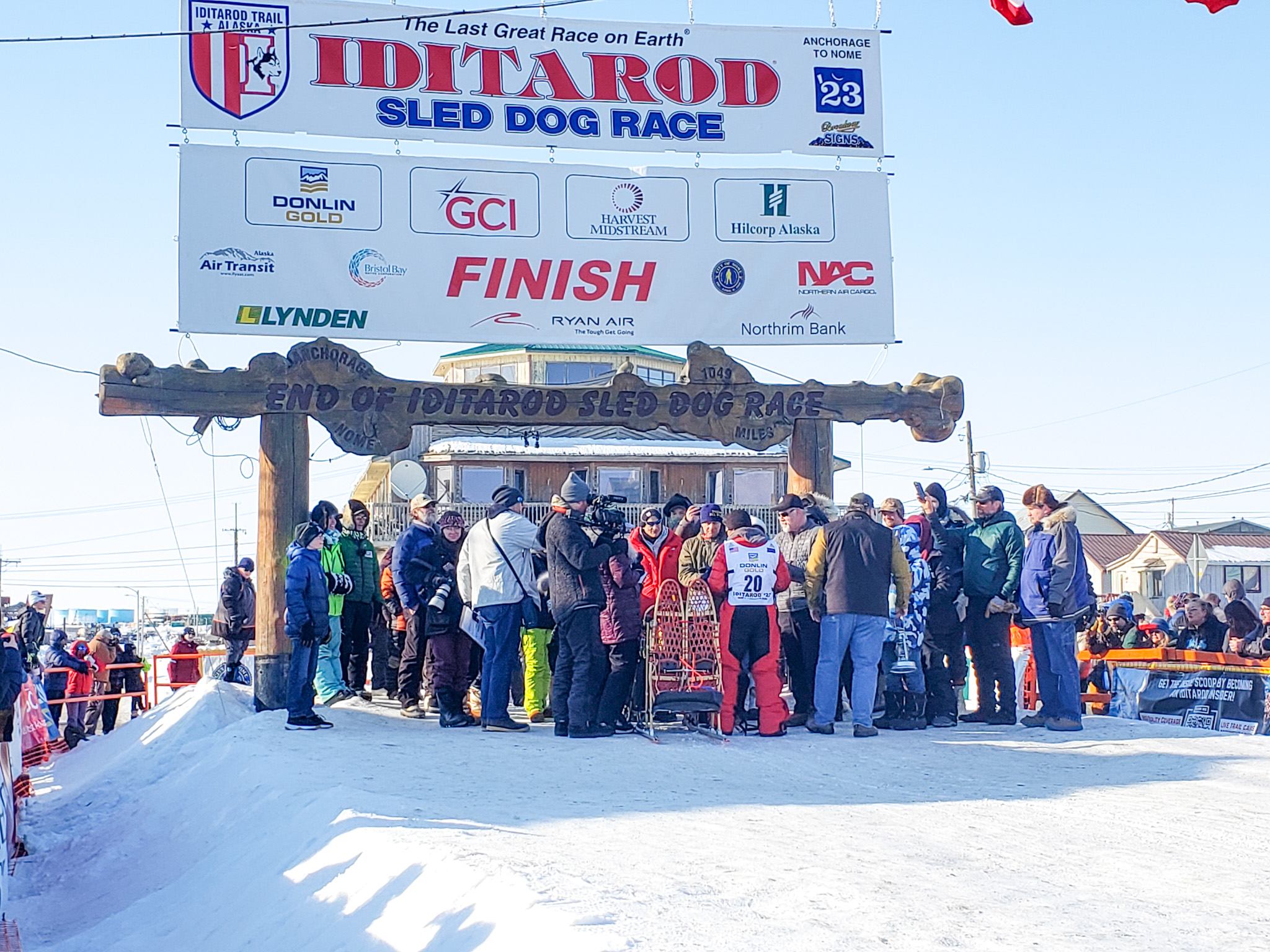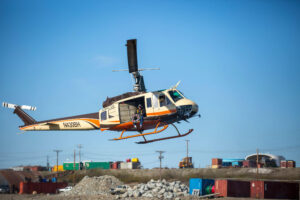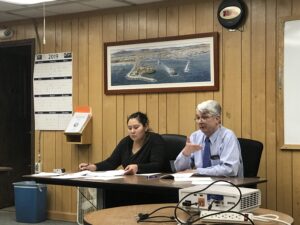KNOM Radio covered as many of the mushers in the small field of 33 as we could. By the time everyone finished, the final count was 29 teams completed the 51st running of the Iditarod. Below you’ll hear from most of them.
Ryan Redington was this year’s Iditarod winner, claiming his first Iditarod and the first race win for the whole family of Redingtons. He finished at 12:12 p.m. on Tuesday, March 14 with a team of six dogs. His run from White Mountain to Nome took longer than expected due to poor visibilities and terrible winds between Safety and White Mountain in an area known locally as “the blowhole.”
His total race time was eight days, 21 hours and 12 minutes.
Second place — Pete Kaiser of Bethel chased Redington up until Elim, where he decided it was better for his team to take extra rest rather than push them to catch Redington. This is Kaiser’s best finish since he won Iditarod in 2019, also on the southern route. He finished in Nome this year at 1:36 p.m. Tuesday afternoon with a total race time of eight days, 22 hours and 36 minutes.
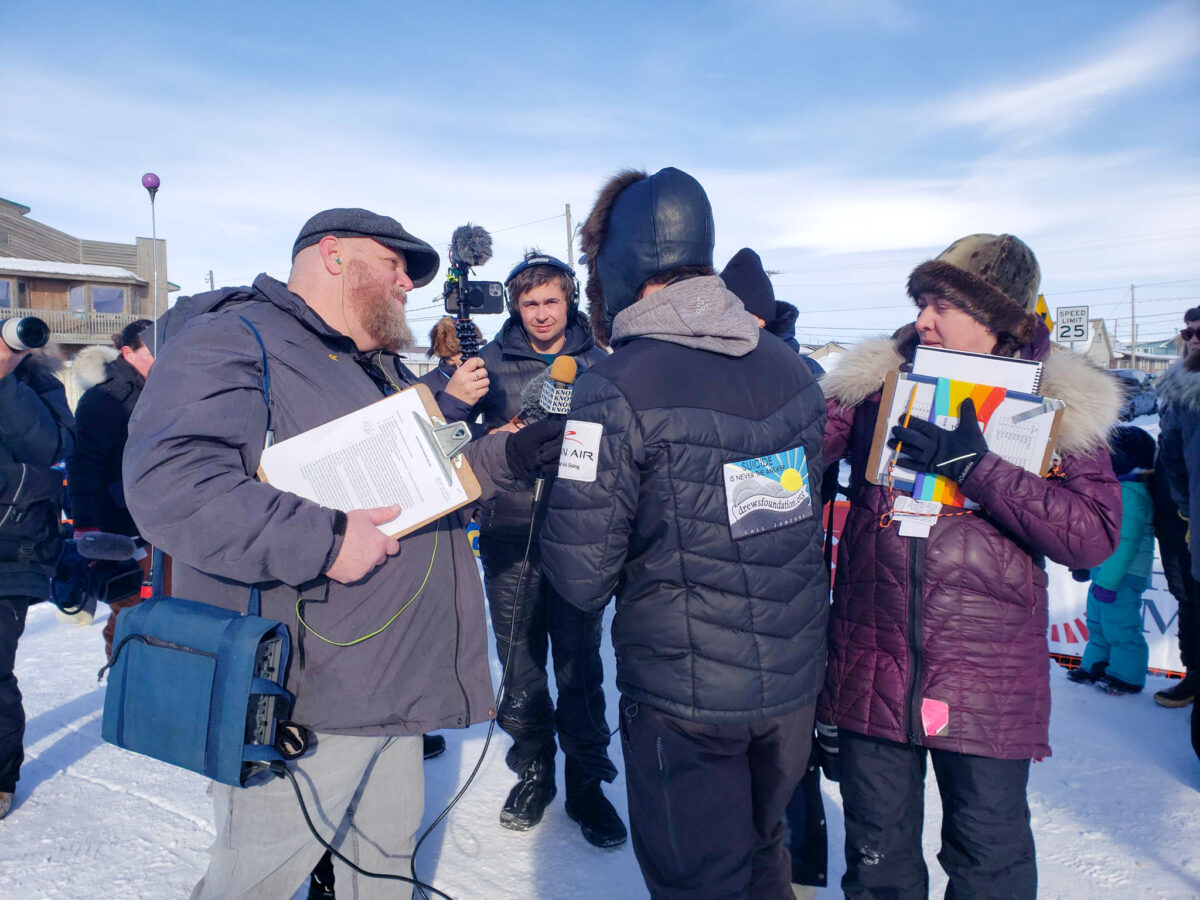
Third place — Richie Diehl of Aniak claimed his best Iditarod finish to date and rounded out the top 3 marking the first time in Iditarod history the top three mushers have all been Alaska Native. He finished in Nome roughly one hour behind Kaiser Tuesday afternoon with a total race time of eight days, 23 hours and 40 minutes.
Fourth place — Matt Hall surged to the front after being back in the middle of the pack on the Norton Sound coast and claimed his first top-five finish in his fifth running of the Iditarod. This marks his second top-ten finish to date and he told KNOM it helps solidifies his commitment to continue competing in this race. Hall finished in Nome Tuesday just before 5:22 p.m. with a total race time of nine days, two hours and 21 minutes.
Fifth place — Jessie Holmes was competing with reigning champ Brent Sass heading into the Yukon River checkpoints, claiming the First to the Yukon Award, before he says he changed things up and decided to put on the breaks. This marks Holmes’ second top-five finish in a row. He checked into Nome at 7:08 p.m. Tuesday night with a total race time of nine days, four hours and eight minutes.
Sixth place — Kelly Maixner ran an elite dog team from Dallas Seavey’s kennel, and was rewarded with his best finish thus far in his Iditarod career. In his eight Iditarod attempts prior to this year, he had never broke the top ten and decided to take a break from the race after 2020. This time around he finished in Nome on Tuesday, March 14 at 8 p.m. with a total race time of nine days and five hours.
His daughter was one of several family members to greet him under the burled arch. She sang a classic Iditarod song originally sung by Hobo Jim.
Seventh place — Eddie Burke Jr. claims the rookie of the year thanks to his experience with several mid-distance races and Aaron Burmeister’s sled dogs from the Alaskan Wildstyle Racing Kennel. Despite some mishaps along the way, like falling asleep at the wheel and his dogs taking off without him for 18 miles or so, Burke Jr. won the competitive race between him and the other main rookie, Hunter Keefe.
Burke Jr. finished in Nome Tuesday just before end of day at 11:37 p.m. with a total race time of nine days, eight hours and 37 minutes.
Eighth place — Matthew Failor is this year’s most improved musher, as voted on by the Iditarod Trail Committee. This marks Failor’s best Iditarod finish and his first top ten. He crossed under the burled arch in Nome just after 12 a.m. on Wednesday, with a total race time of nine days, nine hours and 20 minutes.
Ninth place — Mille Porsild claimed her second top ten finish in four years. She struggled on the last run in from Safety Roadhouse to Nome, as many other mushers did in the top ten. The last 22 miles or so of the race took her over six hours to complete. Porsild finished in Nome at 3:42 a.m. Wednesday morning with a total race time nine days, 12 hours and 42 minutes.
Tenth place — Wade Marrs made waves when he was the first to the Iditarod checkpoint and did his 24 hour layover there, claiming the coveted gold nugget award. Unfortunately for him that strategy didn’t get him to the front of the pack in the long run, but he was rewarded with another top-ten finish from his 12 Iditarod races. Marrs finished in Nome Wednesday afternoon at 2:07 p.m. with a total race time of nine days, 13 hours and seven minutes.
Eleventh place — Hunter Keefe had the rare opportunity to race with Rayme Redington’s dogs for his rookie run in the Iditarod. Keefe has completed several mid-distance races with this team, and was prepared more than most rookies would have been. Although he didn’t win the Rookie of the Year award, Keefe was all smiles at the finish line in Nome. He arrived on Wednesday afternoon at 2:37 p.m. just 30 minutes outside of the top ten with a total race time of nine days, 23 hours and 39 minutes.
Twelfth place — Dan Kaduce was unable to repeat his impressive feat of breaking the top ten last year while finishing with a full team of 14 dogs. But in fact no one finished this year’s Iditarod with more than 12 dogs. This marks Kaduce’s fifth Iditarod finish and third consecutive. Kaduce pulled under the burled arch in Nome on Wednesday afternoon at 3:23 p.m. with a total race time of ten days, zero hours and 23 minutes.
Thirteenth place — Christian Turner last ran the Iditarod in 2015 when he finished in 15th place. This year he was on the runners behind four-time winner Mitch Seavey’s team. Turner is from Mackay Australia and was offered a chance to run Seavey’s team after working with him during the summer.
He finished in Nome on Wednesday afternoon at 4:16 p.m. with a total race time of ten days, one hour and 16 minutes.
Fourteenth place — Jessie Royer took a hiatus from the 2022 Iditarod and came back this year picking up right where she left off, in the top 15. This year marks Royer’s 20th Iditarod finish and continues her streak of no scratches. She finished in Nome about 20 minutes behind Christian Turner with a total race time of ten days, one hour and 35 minutes.
Fifteenth place — Aaron Peck was greeted by his family from Alberta, Canada under the burled arch in Nome which was a tender surprise for him. Including this year’s finish, Peck has placed in the top 15 in his last three Iditarods with his highest place coming in the 2022 race. He came into Nome this year on Wednesday evening at 6:15 p.m. with a total race time of ten days, three hours and 15 minutes.
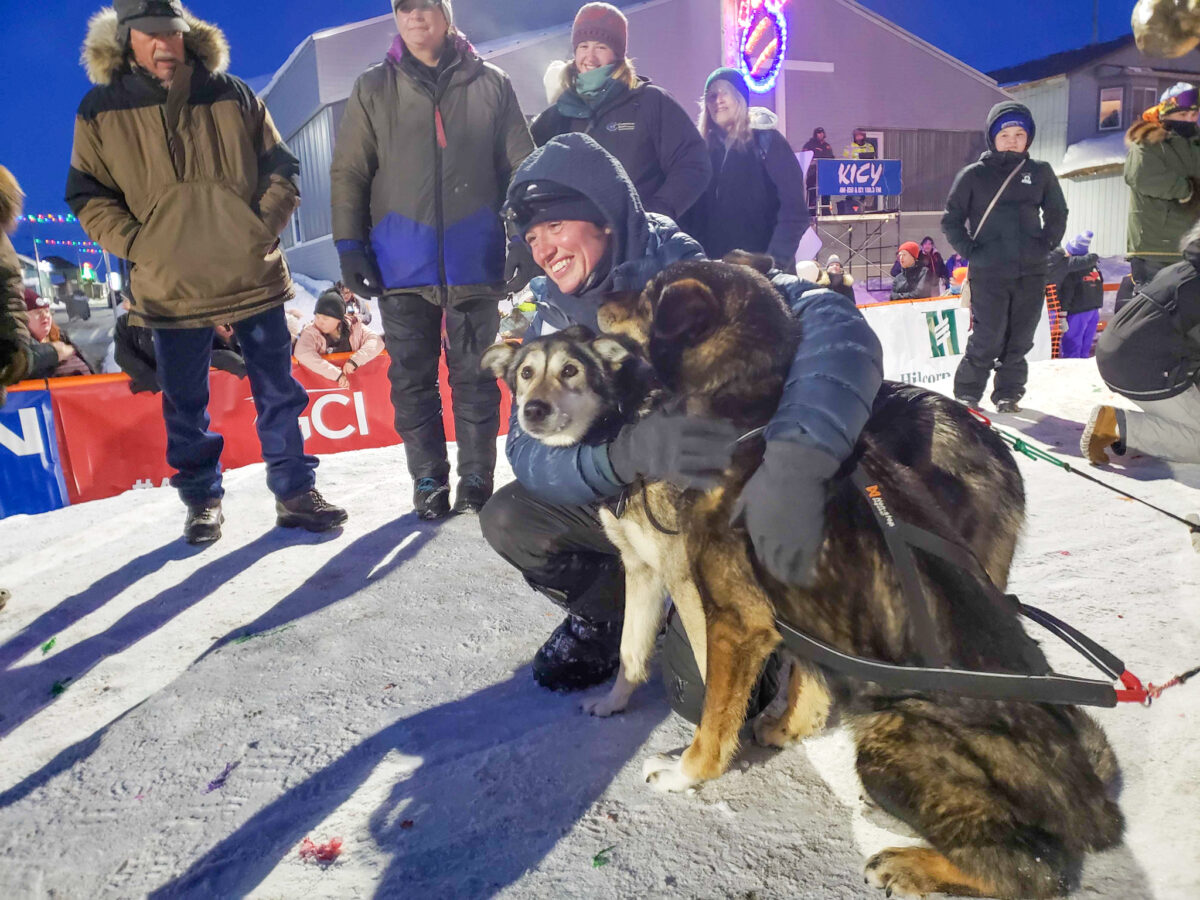
Sixteenth place — KattiJo Deeter has officially become and Iditarod veteran after her rookie attempt in 2022 ended at the Topkok Shelter Cabin less than 60 miles from Nome. She and a few other mushers had to call for assistance due to a terrible blizzard and trail conditions.
This year that same stretch of trail was a lot less challenging according to Deeter. When she came under the burled arch Wednesday evening, around 9:45 p.m., she was all smiles. Her total race time was ten days, six hours and 44 minutes.
Seventeenth place — Nicolas Petit started out this race in a very competitive position with a fast pace until he reached Eagle Island. After that checkpoint, Petit told Iditarod Insider he was changing his strategy and looking on the bright side of not chasing for the lead. This year marks his worst place finish since the 2012 Iditarod when Petit finished in 29th place.
He finished in Nome early Thursday morning March 16th with a total race time of ten days, ten hours and nine minutes.
(Unfortunately KNOM Radio does not have an audio recording of Nic Petit’s finish in Nome.)
Eighteenth place — Riley Dyche made considerable improvements this year and was a top choice for the most improved musher award. In his three other Iditarod attempts, his top finish was 25th place, but that all changed this year as he broke into the top 20. He finished in Nome on Thursday with a total race time of ten days, 14 hours and 11 minutes.
Nineteenth place — Ramey Smyth has completed 27 Iditarods including this one, with seven consecutive races and half of them were in the top ten. This year Smyth fell back a little bit in the standings but continues to be one of the mainstay veteran mushers competing year after year in the Iditarod. He finished in Nome on Thursday morning at 6:24 a.m. with a total race time of ten days, 15 hours and 24 minutes.
Twentieth place — Deke Naaktgeboren claimed his best finish yet in his third Iditarod race. This year he brought 12 dogs with him to Nome, the largest team to cross under the burled arch in the 2023 race.
He finished in Nome on Thursday morning at 10:05 a.m. with a total race time of ten days, 15 hours and 24 minutes.
Twenty-first place — Kristy Berington and her twin sister Anna have a habit of traveling together on the trail during Iditarod, especially during the last few years. Kristy has a couple more finishes though and this marks her 14th running of the Last Great Race. Kristy hasn’t broken the top 20 since 2019 when she finished in 16th place but it was decided at the finish line that she would finish ahead of her sister this year. Kristy crossed under the burled arch Thursday afternoon at 2:50 p.m. with a total race time of ten days, 23 hours and 50 minutes.
Twenty-sescond place — Anna Berington had one more dog on the line when she finished one place behind her sister this year. Similar to Kristy, Anna hasn’t broken the top 20 since 2019 when she finished in 17th place. This year, Anna Berington crossed under the burled arch in Nome just after 2:50pm Thursday afternoon with a total race time of ten days, 23 hours and 51 minutes.
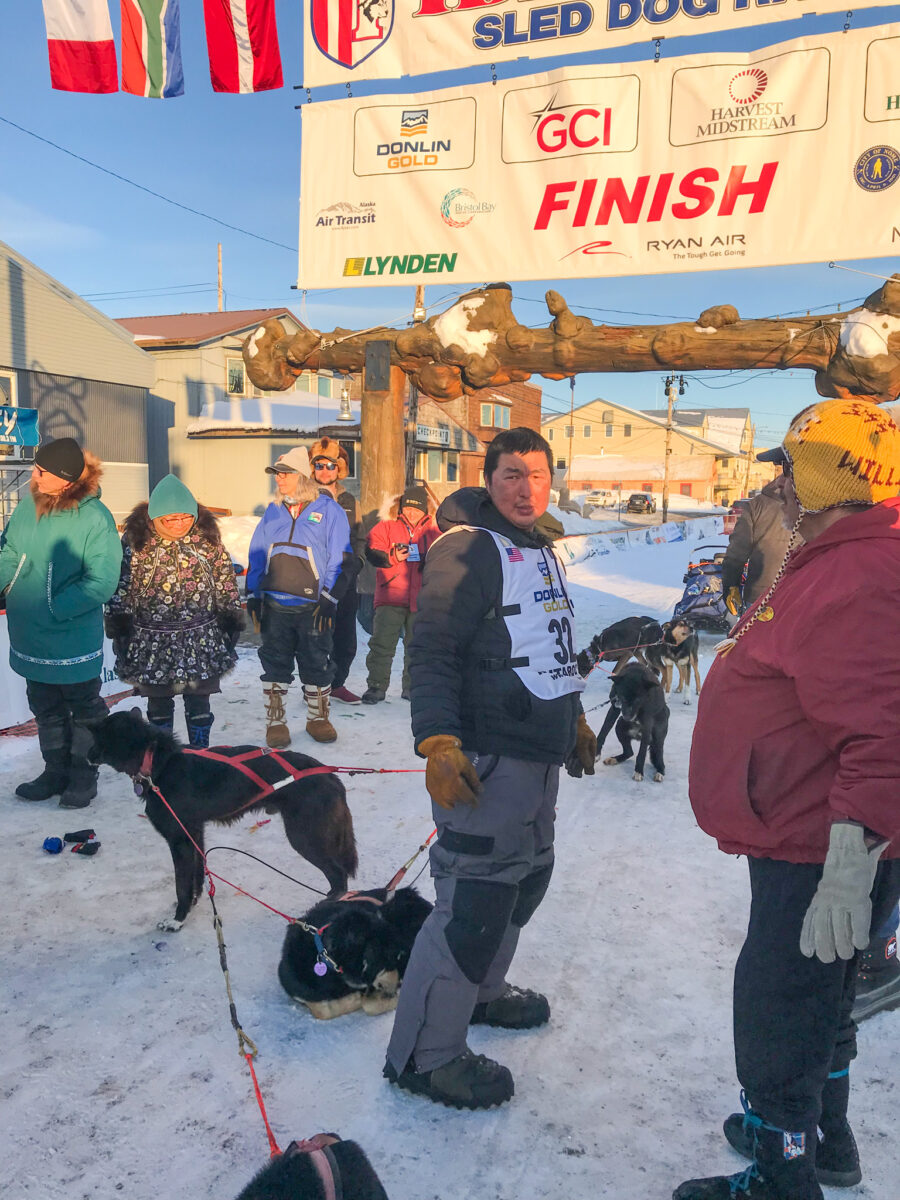
Twenty-third place — Michael Williams Jr. of Akiak claimed his eighth Iditarod finish this year, after taking a break since the 2018 race. At the finish line in Nome, Williams spoke about his father Mike Williams Sr. pushing him to run the Iditarod this year and how grateful he was to have him there under the burled arch. He pulled into Nome Thursday evening a few minutes before 8 p.m. with a total race time of 11 days, four hours and 57 minutes.
Twenty-fourth place — Bailey Vitello completed his rookie run after traveling all the way from his home in New Hampshire with his father, Gregg who decided to scratch about halfway through the race. During his finish line interview, Bailey hinted at the possibility of him coming back to race the Iditarod again in the future. He crossed under the burled arch in Nome Friday, March 17 just before 7:50 a.m. with a total race time of 11 days, 16 hours and 49 minutes.
Twenty-fifth place — Joanna Jagow skipped last year’s Iditarod after completing her rookie run in 2021. That year she finished in 29th place and has since improved in the standings. Jagow crossed under the burled arch in Nome at 8:07 a.m. Friday with a total race time of 11 days, 17 hours and seven minutes.
Twenty-sixth place — Gerhardt Thiart was one of a handful of mushers who got stuck in a ground blizzard during the 2022 Iditarod and had to call for assistance before reaching the finish line in Nome. In his own words, Thiart said, “I froze my butt off for 12 days and all I needed was six more hours. Right place, wrong time. This is the Iditarod.” But this year, once again on the runners behind Mitch Seavey’s B team of sled dogs, he was able to finish what he described as a 20-year dream.
Thiart finished in Nome on Friday at noon with a total race time of 11 days and 21 hours.
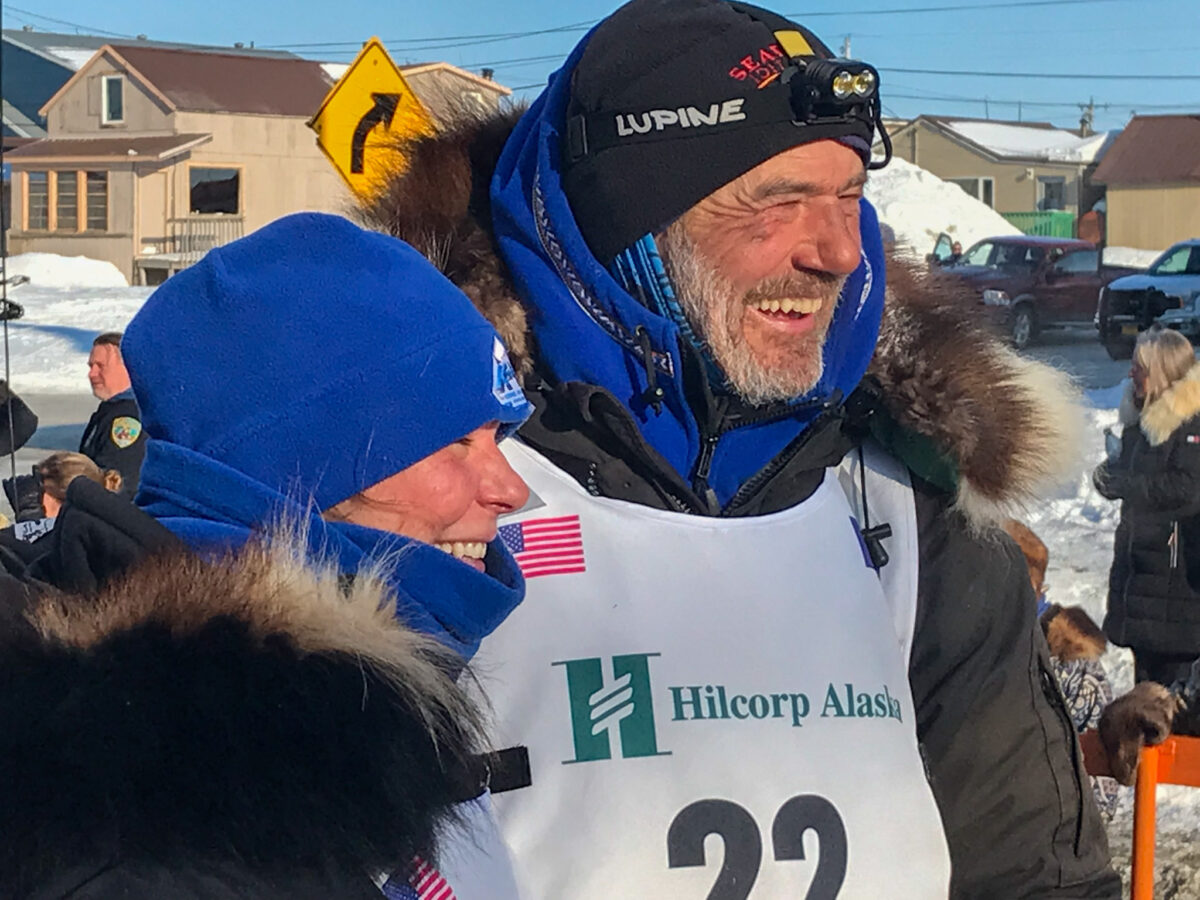
Twenty-seventh place — Bridgett Watkins lived in Nome for six years and had made it her mission to complete the 1,000-mile journey to Nome last year but like several others, her race was cut short and she vowed to finish her rookie run this year. As the daughter of Iditarod legend Aliy Zirkle, Watkins brought some top dogs with her from her kennel in Fairbanks to officially become a veteran of the Iditarod. She finished in Nome less than ten minutes after Gerhardt Thiart with a total race time of 11 days, 21 hours and eight minutes.
Twenty-eighth place — Jed Stephenson came to Nome by way of Sandpoint, Idaho and got the mushing bug with some help from Iditarod finishers like Lindwood Fiedler and Gabe Dunham. Stephenson completed his rookie run of the Iditarod when he finished in Nome Friday afternoon at 3:44 p.m. with a total race time of 12 days, zero hours and 44 minutes.
Twenty-ninth place/Red Lantern — Jason Mackey represented the iconic Mackey family with pride, as he carried both his brother Lance’s ashes and his mother’s along the trail this year. Jason hasn’t run the Iditarod since 2017 but hinted under the burled arch that he might resume running the 1,000-mile race again next year. For this year, he took the coveted Red Lantern position after finishing in Nome just after 5 p.m. on Friday with a total race time of 12 days, two hours and three minutes.
Image at top: The Iditarod 2023 wrapped up on March 17th in Nome with Jason Mackey under burled arch as the red lantern with Greg Knight reporting (Photo from Davis with KNOM 2023).

